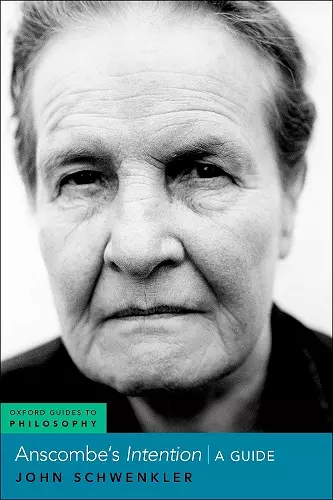Anscombe's Intention
A Guide
Format:Paperback
Publisher:Oxford University Press Inc
Published:19th Nov '19
Currently unavailable, and unfortunately no date known when it will be back
This paperback is available in another edition too:
- Hardback£98.00(9780190052027)

Written against the background of her controversial opposition to the University of Oxford's awarding of an honorary degree to Harry S. Truman, Elizabeth Anscombe's Intention laid the groundwork she thought necessary for a proper ethical evaluation of actions like the bombing of Hiroshima and Nagasaki. The devoutly Catholic Anscombe thought that these actions made Truman a murderer, and thus unworthy of the university's honor-but that this verdict depended on an understanding of intentional action that had been widely rejected in contemporary moral philosophy. Intention was her attempt to work out that understanding and argue for its superiority over a conception of intention as an inner mental state. Though recognized universally as one of the definitive works in analytic philosophy of action, Anscombe's book is often dismissed as unsystematic or obscure, and usually read through the lens of philosophical concerns very far from her own. Schwenkler's Guide offers a careful and critical presentation of Anscombe's main lines of argument at a level appropriate to advanced undergraduates but also capable of benefiting specialists in action theory, moral philosophy, and the history of analytic philosophy. Further, it situates Intention in a context that emphasizes Anscombe's debts to Aristotle, Aquinas, and Wittgenstein, and her engagement with the work of contemporaries like Gilbert Ryle and R.M. Hare, inviting new avenues of engagement with the ideas of historically important philosophers.
Elizabeth Anscombe's Intention has emerged as one of the most influential texts of twentieth century analytic philosophy, despite the fact that its central arguments are notoriously difficult to understand. John Schwenkler has written an accessible and insightful commentary that will be invaluable for students and experts alike. Just as Anscombe's commentary on Wittgenstein's Tractatus aimed to rescue its legacy from its most influential supporters, so too Schwenkler's commentary clears away decades of empiricist misinterpretations and misappropriations, allowing readers to see Anscombe's masterwork with fresh eyes. It is a remarkable achievement, worthy of widespread attention. * Jennifer Frey, University of South Carolina *
Intention is a fiercely difficult, rich, and dense book, and even experts need help navigating it. This is the kind of guide that I will look to in my own work, and that I will recommend to interested graduate students, and that I am likely to use every time I teach a course with Intention. Schwenkler's treatment is pitched at an ideal level. * Kim Frost, University of California, Riverside *
Schwenkler's Guide makes a tremendous and invaluable contribution as it sheds light on Anscombe's seminal yet obscure book. It is especially valuable because it is so timely. Recent years have seen a resurgence of interest in Anscombe. I expect Schwenkler's book to serve as an essential resource for a new generation of readers. * Berislav Marusic, Brandeis University *
Anscombe's Intention is both profoundly difficult and hugely influential, yet there is no standard interpretive guide to this elusive text. Schwenkler's commentary is thus a welcome intervention. His meticulous, accessible book will be of great use to students of action theory and readers of Anscombe. * Kieran Setiya, MIT *
ISBN: 9780190052034
Dimensions: 206mm x 140mm x 18mm
Weight: 839g
272 pages